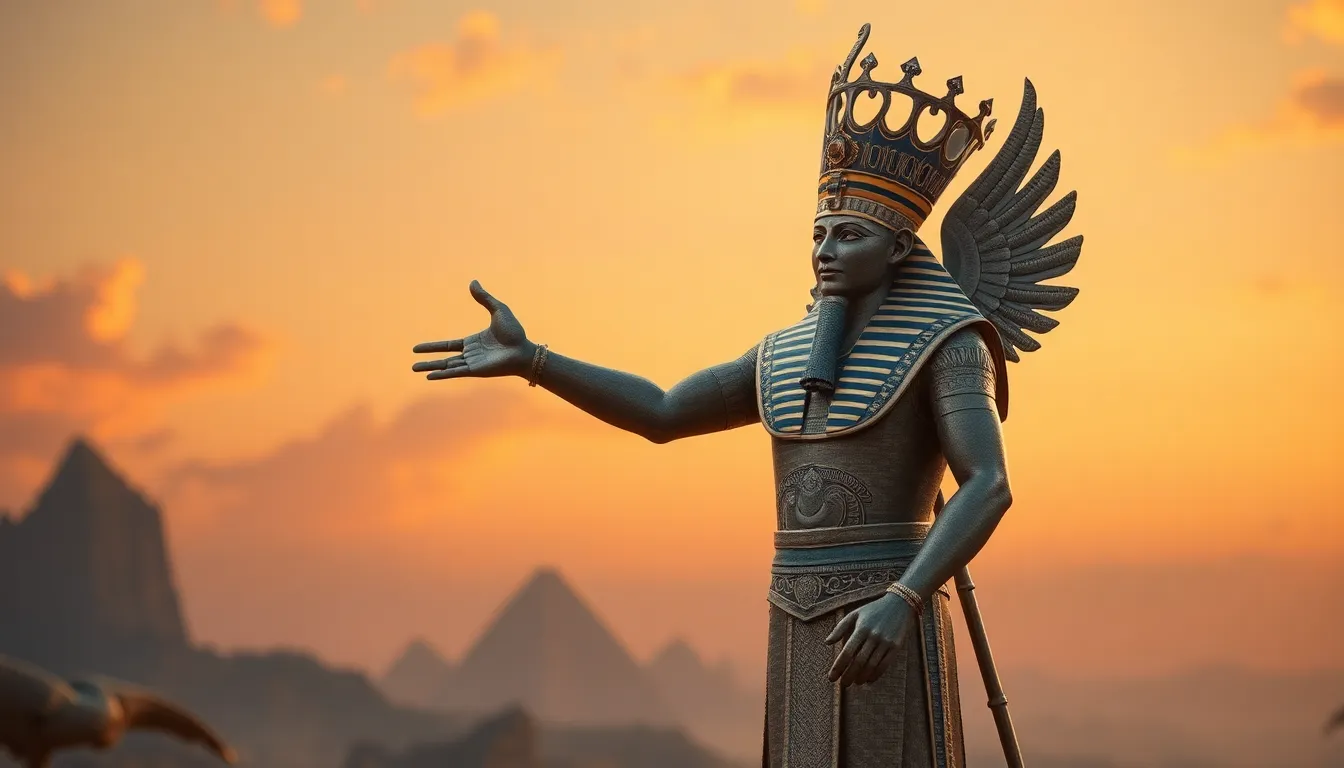The Role of Divine Kingship in Egyptian Science
I. Introduction
Divine kingship in Ancient Egypt refers to the belief that the Pharaoh is not only a political leader but also a divine figure, chosen by the gods to rule on Earth. This concept was integral to Egyptian society, intertwining religion, politics, and culture in a way that shaped the civilization’s identity.
The significance of divine kingship extends beyond mere governance; it was a cornerstone of Egyptian belief systems, linking the mortal realm to the divine. This article aims to explore the intersection of divine kingship and scientific advancements throughout Egyptian history, highlighting how this unique system influenced various fields of study and innovation.
II. Historical Context of Divine Kingship
The concept of divine kingship evolved significantly from the early dynasties through to the Ptolemaic period. Initially, Pharaohs were seen as embodiments of the god Horus, establishing a direct connection between the divine and the ruling class. Over time, this belief system expanded to include the idea of the Pharaoh as Osiris, the god of the afterlife, further entrenching their divine status.
Key figures in Egyptian history, such as Pharaoh Khufu, played pivotal roles in shaping the notion of divine rule through monumental construction projects like the Great Pyramid of Giza. These achievements not only showcased the Pharaoh’s power but also served as a testament to their divine favor.
The relationship between divine kingship and traditional Egyptian beliefs can be seen in various aspects of life, from governance to daily rituals, reinforcing the idea that the Pharaoh was a mediator between the gods and the people.
III. The Pharaoh as a Mediator Between Gods and Humans
The Pharaoh’s role extended beyond governance; he was the chief priest of every temple and performed crucial religious rituals and ceremonies. These acts were considered essential to maintaining Ma’at, the cosmic order. The Pharaoh was perceived as a divine entity, embodying both human and godly attributes. This perception had profound implications for scientific endeavors.
- Religious Rituals: The Pharaoh led rituals that were believed to ensure the favor of the gods, which in turn was thought to bless the land with fertility and prosperity.
- Divine Authority: The divine status of the Pharaoh motivated scholars and priests to engage in scientific pursuits, believing that their work was a way to honor the gods.
IV. Divine Kingship and the Patronage of Science
Pharaohs were known to sponsor scientific research and technological innovations, viewing these advancements as extensions of their divine rule. This patronage led to notable projects in various fields:
- Architecture: The construction of temples and pyramids exemplified advanced engineering and architectural knowledge.
- Mathematics: The need for land measurement, taxation, and construction projects spurred developments in mathematics, particularly geometry.
- Medicine: The Pharaoh’s endorsement of medical practices led to the documentation and preservation of medical knowledge.
The impact of royal patronage on the development of specialized knowledge was significant, as it allowed scholars to pursue their studies under the auspices of divine approval, further legitimizing their work.
V. Astronomy and Cosmology under Divine Kingship
The Pharaoh’s role in astronomical observations was crucial for the creation and maintenance of calendar systems. The Egyptians relied heavily on celestial events to guide agricultural practices and religious festivals.
- Calendar Systems: The Egyptian calendar was based on lunar and solar cycles, with the Nile’s flooding season closely linked to the heliacal rising of Sirius.
- Celestial Events: The Pharaoh’s ability to predict celestial events reinforced his divine authority, as it was believed that he could influence the heavens.
Egyptian contributions to astronomy laid the groundwork for later scientific advancements, influencing neighboring cultures and civilizations.
VI. Medicine and Healing Practices Tied to Divine Kingship
The Pharaoh played a vital role in promoting medical knowledge and practices, often associating healing with divine intervention. Medical texts, such as the Edwin Smith Papyrus, were endorsed by the Pharaoh, showcasing the intersection of religion and medicine.
- Divine Healing: Egyptians believed that certain illnesses were manifestations of divine displeasure, and healing was seen as a sacred duty.
- Case Studies: Famous medical texts like the Ebers Papyrus included treatments and remedies that were often attributed to divine inspiration.
This blend of faith and medicine not only advanced medical knowledge but also reinforced the Pharaoh’s status as a divine healer.
VII. The Legacy of Divine Kingship on Later Scientific Developments
The influence of Egyptian scientific practices extended beyond its borders, impacting neighboring cultures and civilizations. The preservation of knowledge through the lens of divine kingship ensured that many scientific advancements were documented and passed down through generations.
- Influence on Neighboring Cultures: Greek scholars, such as Ptolemy, drew heavily from Egyptian astronomical and mathematical knowledge.
- Long-term Effects: The integration of scientific practices with divine authority laid a foundation for the evolution of science in the Mediterranean world.
VIII. Conclusion
In summary, divine kingship played a crucial role in shaping the scientific landscape of Ancient Egypt. The Pharaoh’s unique position as a divine mediator facilitated advancements in various fields, including astronomy, medicine, and architecture.
The lasting significance of divine kingship in the context of science is evident in how it fostered a culture of inquiry and innovation, rooted in spiritual belief. Further research could explore the nuances of this relationship, examining how divine kingship influenced other aspects of Egyptian life and its enduring legacy in the history of science.




